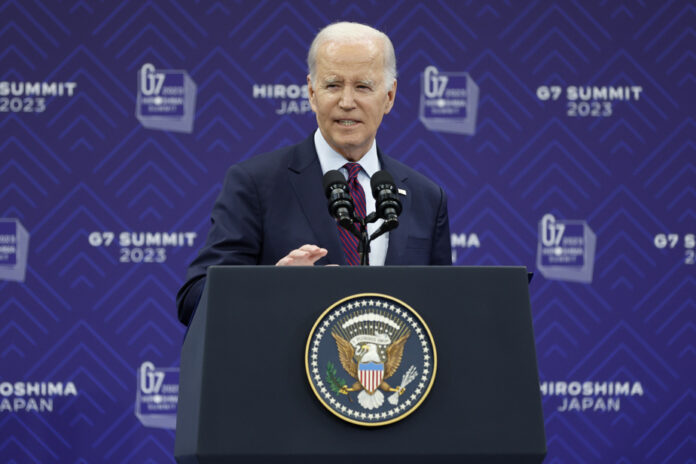(Washington) Joe Biden and Kevin McCarthy, his main Republican opponent on the issue of raising the US public debt, will resume discussions on Monday after a weekend of deadlock to try to find a quick agreement and avoid a dangerous default. the United States.
The American president, just returned from Japan where he participated in the G7 Summit, is due to receive the Republican leader of the House of Representatives on Monday.
The two men spoke on Sunday as Joe Biden was on his plane to return to Washington. Kevin McCarthy spoke of a “productive” discussion, according to US media, indicating that teams from both sides resumed discussions.
This positive signal is the first since, on Friday, a meeting between Democratic and Republican negotiators, at the White House but without Joe Biden, already on his way to Hiroshima, turned sour.
Because the Republicans require, to give their green light, a reduction in federal spending. The Biden administration refuses, and proposes for its part to reduce certain expenses while increasing taxes for the richest and companies.
“Washington can’t keep spending money we don’t have,” Kevin McCarthy tweeted.
Joe Biden warned him that he would refuse a deal “that protects billions (of dollars) in subsidies for big oil companies while putting the health care of 21 million Americans at risk. Or who protects wealthy tax evaders while jeopardizing food aid for a million Americans.”
“The United States has never defaulted on its debts. And it will never be the case, “said the American president again.
But that is what is likely to happen if no agreement is reached. This unprecedented situation, with potentially catastrophic consequences for the American and even global economy, could theoretically occur as early as June 1.
The United States could then no longer be able to reimburse the holders of American Treasury bonds, the king of investments in global finance. The government would also no longer be able to pay certain salaries of civil servants, nor pensions of veterans, among others.
Even a decision taken at the last minute would have consequences. In 2011, it was the only threat of bankruptcy that for the first time caused the United States to lose its precious triple A, the best credit rating from the rating agencies.
Concrete effects are already being felt, Treasury Secretary Janet Yellen warned on Tuesday, noting that investors are “more reluctant to hold sovereign debt that matures in June”.
And the shadow of Donald Trump hangs over these negotiations. The former Republican president on May 10 urged Republicans, over whom he retains immense influence, to “cause a default” if Democrats do not agree to “massive cuts” in spending. And on Friday, he called on them to “not bend.”
On Sunday, White House spokeswoman Karine Jean-Pierre, deploring the “extreme partisan demands” proposed by the conservatives, pointed the finger at Republican officials, under the thumb of those close to Donald Trump according to her.
Opposite, Kevin McCarthy had for his part accused “the left wing of the Democratic Party” of being “in control”.
If the disagreements remain too deep, Joe Biden would nevertheless be left with one card: the 14th Amendment to the US Constitution, which provides that “the validity of the public debt of the United States … shall not be questioned”, and therefore makes it possible to act as if the debt ceiling did not exist.
While indicating that he was studying this possibility, Joe Biden was however skeptical, and Janet Yellen also referred to “legal uncertainty” and a “tight deadline”.
Like almost all major economies, the United States lives on credit. But, it is an American peculiarity, it is the prerogative of Congress to vote to raise the maximum amount of public debt that the world’s largest economy is authorized to accumulate.
And what was initially only a formality has now become the stake of a real political battle.















